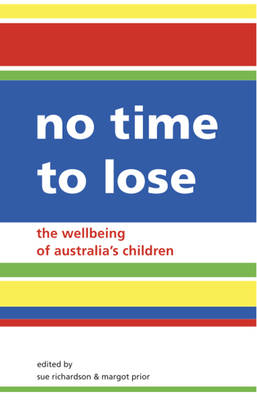
Door een staking bij bpost kan je online bestelling op dit moment iets langer onderweg zijn dan voorzien. Dringend iets nodig? Onze winkels ontvangen jou met open armen!
- Afhalen na 1 uur in een winkel met voorraad
- Gratis thuislevering in België vanaf € 30
- Ruim aanbod met 7 miljoen producten
Door een staking bij bpost kan je online bestelling op dit moment iets langer onderweg zijn dan voorzien. Dringend iets nodig? Onze winkels ontvangen jou met open armen!
- Afhalen na 1 uur in een winkel met voorraad
- Gratis thuislevering in België vanaf € 30
- Ruim aanbod met 7 miljoen producten
Zoeken
€ 57,95
+ 115 punten
Omschrijving
A landmark investigation of the state of children's wellbeing in Australia, with contributions from Sue Richardson, Margot Prior, Steve Zubrick, Sven Silburn, Janet McCalman, Johanna Wyn and more.
Young Australians have borne the brunt of the immense changes in the nation's social and economic life since the mid-1970s. While many children are thriving and optimistic, many others are unhealthy, depressed, poorly cared for, ill-equipped to create a satisfying adult life, and struggling to navigate the increasingly risky transition between dependent child and independent adult.
In No Time to Lose, leading Australian scholars investigate the consequences for children of changes in work patterns and the job market, marriage breakdown, higher educational expectations, community breakdown, and the growing divide between those who have and haven't benefited from the nation's increased prosperity. They reflect on the community's responsibility for children, and on the lessons of history, then critically assess what needs to be done to enable our children to look to the future with optimism.
Young Australians have borne the brunt of the immense changes in the nation's social and economic life since the mid-1970s. While many children are thriving and optimistic, many others are unhealthy, depressed, poorly cared for, ill-equipped to create a satisfying adult life, and struggling to navigate the increasingly risky transition between dependent child and independent adult.
In No Time to Lose, leading Australian scholars investigate the consequences for children of changes in work patterns and the job market, marriage breakdown, higher educational expectations, community breakdown, and the growing divide between those who have and haven't benefited from the nation's increased prosperity. They reflect on the community's responsibility for children, and on the lessons of history, then critically assess what needs to be done to enable our children to look to the future with optimism.
Specificaties
Betrokkenen
- Auteur(s):
- Uitgeverij:
Inhoud
- Aantal bladzijden:
- 346
- Taal:
- Engels
- Reeks:
Eigenschappen
- Productcode (EAN):
- 9780522852202
- Verschijningsdatum:
- 10/07/2005
- Uitvoering:
- Paperback
- Formaat:
- Trade paperback (VS)
- Afmetingen:
- 138 mm x 212 mm
- Gewicht:
- 400 g

Alleen bij Standaard Boekhandel
+ 115 punten op je klantenkaart van Standaard Boekhandel
Beoordelingen
We publiceren alleen reviews die voldoen aan de voorwaarden voor reviews. Bekijk onze voorwaarden voor reviews.











